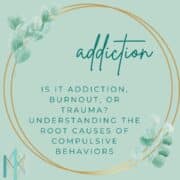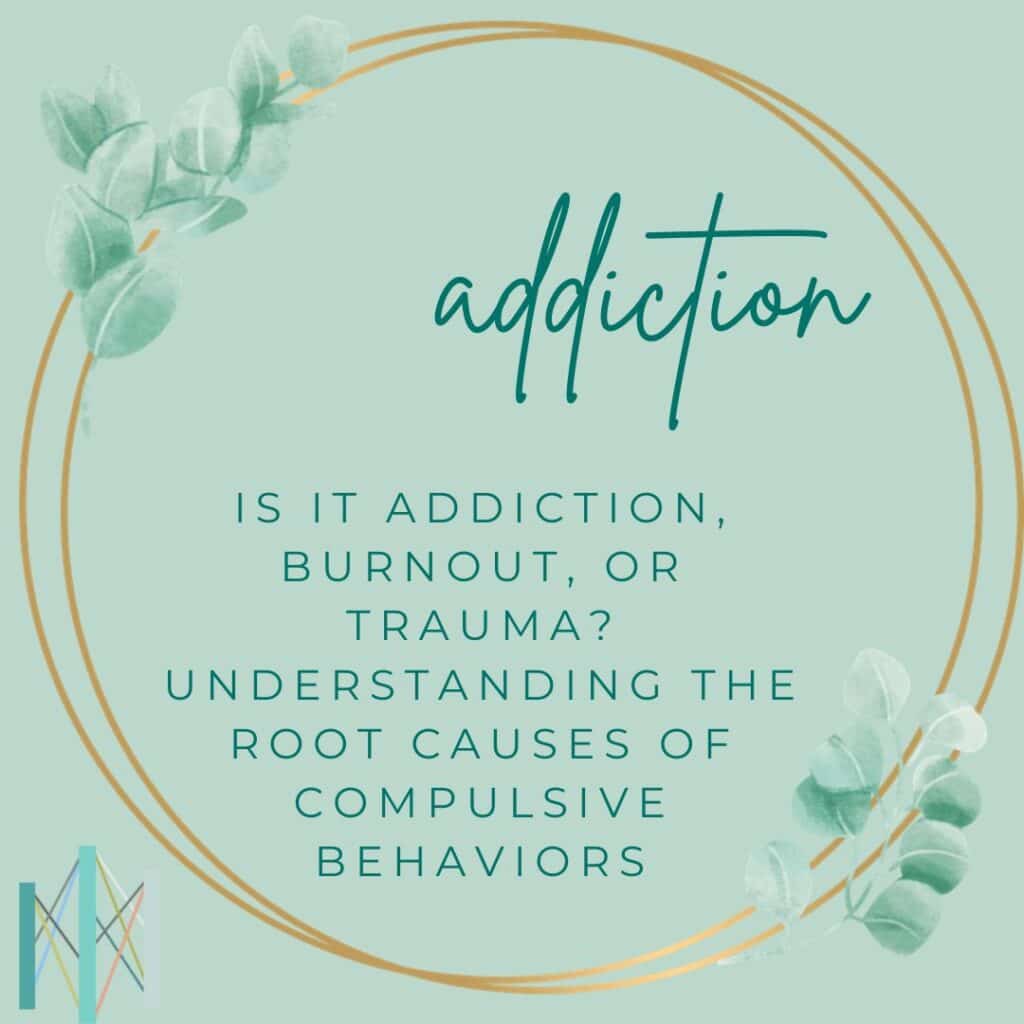

When you’re stuck in a cycle of compulsive behavior—whether it’s endless scrolling, substance use, overworking, or people-pleasing—it’s easy to label the problem as addiction. But what if addiction is only part of the story? Compulsive behaviors often have complex roots, including burnout, trauma, and underlying mental health struggles.
In a city like San Francisco, where high-pressure careers collide with a vibrant social scene and wellness culture, it can be especially hard to untangle where one pattern ends and another begins. Therapy offers more than symptom management; it helps you uncover the “why” behind your behaviors, guiding you toward lasting change.
Browse our Therapist Directory to Find a Therapist Today
The Overlap Between Addiction, Burnout, and Trauma
While addiction, burnout, and trauma are distinct experiences, they often overlap—blurring the lines and making it difficult to understand what’s truly driving your behavior. Here’s how each can show up and where they intersect:
Addiction: The Cycle of Compulsion
Addiction isn’t just about substances; it can also manifest through behaviors like workaholism, compulsive social media use, gambling, or excessive shopping. The hallmark of addiction is the loss of control—continuing a behavior despite negative consequences.
But addiction is often a coping mechanism, not the root issue. People turn to substances or behaviors to numb pain, regulate emotions, or escape discomfort. Over time, the brain becomes wired to seek the temporary relief those behaviors provide.
Burnout: When Exhaustion Becomes a Way of Life
Burnout happens when chronic stress leaves you mentally and physically depleted. It’s common in high-pressure environments like San Francisco’s tech, finance, and healthcare industries. Burnout can manifest as:
- Emotional exhaustion and cynicism
- Loss of motivation or creativity
- Detachment from work or relationships
- Feeling “checked out” or numb
Because burnout disrupts your ability to rest and recharge, people often seek quick dopamine hits through behaviors like binge-watching, substance use, or endless scrolling.
Learn more about burnout.
Trauma: The Root Beneath the Behavior
Trauma—whether from a specific event or ongoing experiences—can create lasting patterns of emotional and physiological dysregulation. People who have experienced trauma may be more likely to develop compulsive behaviors as coping mechanisms. Common trauma responses include:
- Hyperarousal (feeling constantly on edge)
- Emotional numbing or dissociation
- Difficulty trusting others or feeling safe
- Persistent feelings of shame or self-blame
Unaddressed trauma often drives addictive patterns because substances or compulsive behaviors temporarily soothe the pain, even if they create more problems in the long run.
How Burnout, Trauma, and Addiction Intersect
In reality, these experiences rarely exist in isolation. For example:
- A tech worker experiencing burnout might turn to alcohol or cannabis to manage anxiety, which can develop into dependency.
- A survivor of childhood trauma may struggle with people-pleasing or overworking, eventually leading to both burnout and addictive patterns.
- A person experiencing discrimination or microaggressions at work may use compulsive behaviors, like scrolling or gambling, to numb feelings of isolation or injustice.
The cycle is self-perpetuating: trauma drives behaviors that lead to burnout, burnout fuels the need for coping mechanisms, and coping mechanisms can turn into addictive patterns.
How Therapy Helps Untangle the Root Causes of Compulsive Behavior
In San Francisco, where the drive for success and wellness often collide, therapy offers space to slow down, reflect, and understand your patterns without judgment. Here’s how therapy can help:
Addressing Trauma: Healing from the Inside Out
- Trauma-Informed Therapy: Approaches like EMDR (Eye Movement Desensitization and Reprocessing) and somatic therapy help you process traumatic experiences stored in the body.
- Parts Work (e.g., Internal Family Systems): Helps you connect with different parts of yourself—the part that overworks, the part that numbs with substances, and the part that seeks healing—without self-blame.
Treating Burnout: Restoring Balance and Purpose
- Cognitive Behavioral Therapy (CBT): Helps you identify distorted thought patterns that fuel overwork or perfectionism.
- Mindfulness-Based Stress Reduction (MBSR): Supports you in reconnecting with your body and calming your nervous system.
- Work and Career Therapy: In a city like San Francisco, therapy can help you navigate career choices, boundary setting, and values-based living.
Addressing Addiction: Breaking the Cycle with Compassion
- Harm Reduction Therapy: Supports you in reducing harmful behaviors without requiring immediate abstinence, a model that resonates with many in the Bay Area. This approach prioritizes safety, autonomy, and incremental change.
- Somatic Therapy: Focuses on the connection between body and mind, helping you process the physical imprints of addiction and trauma. Somatic techniques, such as breathwork, grounding exercises, and movement, can reduce cravings and increase emotional regulation.
- Expressive Arts Therapy: Uses creative practices such as painting, music, or writing to explore emotions and experiences that may be difficult to express verbally. This approach can help you process the underlying feelings driving addictive behaviors while reconnecting with joy, creativity, and self-expression.
The Importance of a Whole-Person Approach
Healing from compulsive behaviors requires addressing more than the behavior itself—it means healing the pain beneath it. A therapist who understands the intersections of trauma, burnout, and addiction will help you:
- Explore your patterns without judgment
- Understand the role your environment (including work, relationships, and community) plays in your behaviors
- Build new coping mechanisms that address your emotional and physical needs
- Reclaim a sense of agency and self-compassion
Are you ready to explore what’s beneath the behavior?
San Francisco’s culture of ambition, wellness, and experimentation can both contribute to and help heal these patterns. Whether your burnout stems from overwork in the tech sector, your addiction is intertwined with nightlife and social pressures, or your trauma is connected to systemic issues or personal experiences, there is a therapist here who understands your context.
The journey to understanding and healing from addiction, burnout, and trauma isn’t linear. But you don’t have to navigate it alone. Our San Francisco associate therapists specialize in holistic, trauma-informed care that addresses the whole person—not just the symptoms.
Contact us today or browse our therapist directory to find the support that meets you where you are.



